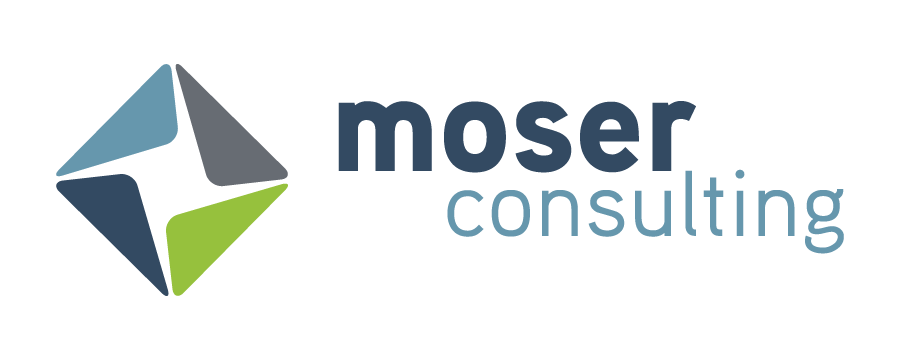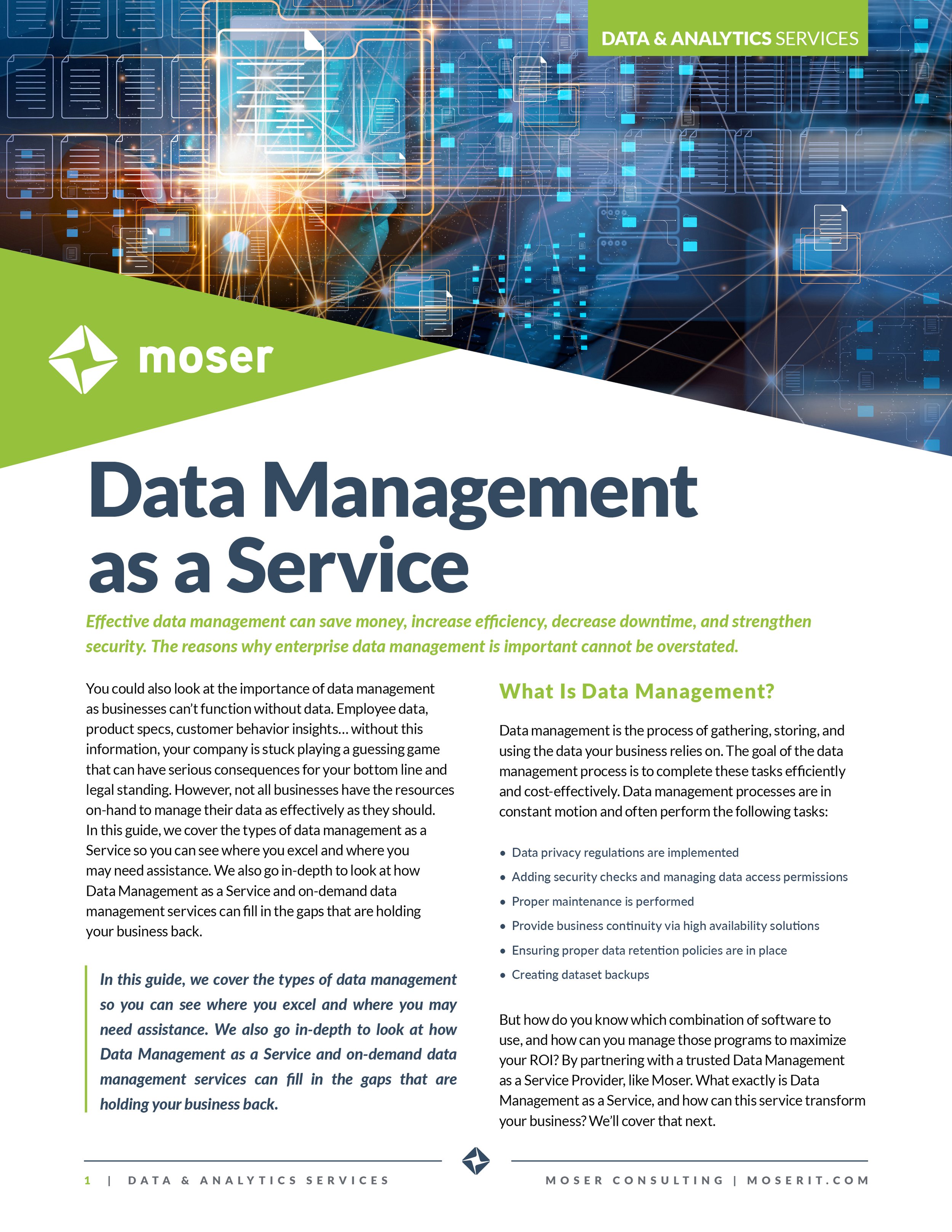
MOSER DEEP DIVE TECH CONTENT:
Data Management as a Service
(DMaaS)
It’s 2023, Do you know where your data is?
Effective data management can save money, increase efficiency, decrease downtime, and strengthen security. The reasons why enterprise data management is important cannot be overstated.
You could also look at the importance of data management through the idea that businesses can’t function without data. Employee data, product specs, customer behavior insights… without this information, your company is stuck playing a guessing game that can have serious consequences for your bottom line and legal standing. However, not all businesses have the resources on-hand to manage their data as effectively as they should. In this guide, we cover the types of data management as a Service so you can see where you excel and where you may need assistance. We also go in-depth to look at how Data Management as a Service and on-demand data management services can fill in the gaps that are holding your business back.
What Is Data Management?
Data management is the process of gathering, storing, and using the data your business relies on. The goal of the data management process is to complete these tasks efficiently and cost-effectively. Data management processes are in constant motion and often perform the following tasks:
Data privacy regulations are implemented
Adding security checks and managing data access permissions
Proper maintenance is performed
Provide business continuity via high availability solutions
Ensuring proper data retention policies are in place
Creating dataset backups
But how do you know which combination of software to use, and how can you manage those programs to maximize your ROI? By partnering with a trusted Data Management as a Service Provider, like Moser. What exactly is Data Management as a Service, and how can this service transform your business? We’ll cover that next.
What Are the 4 Functions of Data Management?
Types of data management functions include data collection, processing, validation, and storing. As a leader assessing your current situation, you may be wondering, “What is basic data management, and am I doing enough?” While it can be tempting to be satisfied after focusing on one function, such as growing server space, data management is most effective when you apply a holistic approach. In other words, each individual function is critical to the success of the other functions and your business goals. Consider how each function operates on its own and then contributes to the bigger picture:
Collection
Businesses need data to succeed—and lots of it! Before you can do anything else with your data, like making complex decisions, you need to collect it and sort it. This function is especially important when you consider the sheer volume, and variety, of data that businesses use. Customer information, financial records, research and development documents, marketing forecasts, survey responses, the list goes on and on. By 2025, it’s estimated that unstructured data will make up 80% of global data. This type of data, which includes text documents and email conversations, is more difficult to identify and record in a database. Therefore, it’s more important than ever to have a data collection system that is capable of gathering data, no matter where you source it from.
Data guides business decisions, so it’s fair to say that poor data guides poor decisions. Data validation checks the quality and accuracy of your data before you use it. That way, when it’s time to make a crucial choice, you’ll be working with the correct information. To ensure your data is accurate and meets your specific requirements, your validation process can include steps such as:
Data type checks that see if the data entered in a field is the type of data that belongs in that field. For example, a data type check may reject phone number fields that contain letters.
Range checks that see if a dataset is within the desired range. This type of check can be useful when analyzing data on customers that spend a specific amount of money on your products per year, for example.
Consistency checks make sure your data makes sense and doesn’t contain logical or logistical errors. For example, if you have a new hire’s first payday before their first day of work, a consistency check would flag that error.
Validation
By itself, data is difficult to use; processing translates and packages data into manageable portions. Starting with your collected sources of raw data, this step leverages machine learning to select specific datasets that are needed for a certain outcome. The selected data sets are then processed into relevant, readable forms, such as graphs, charts, documents, and audio files. Examples of data processing include:
Batch processing, which handles large amounts of raw data during set work periods
Real-time processing, which works towards an output once the input is complete
With an efficient data processing system, your teams can quickly gain key insights from even the largest databases.
Processing
You need space to keep your data where it is easy for your team to access but still secure. Data storage solutions include on-premises, cloud-based, and hybrid options. Oftentimes, it can be more effective to consolidate your storage system. For example, instead of having two separate cloud servers and a small on-premises server, you could switch to a completely cloud-based solution.
Storage
What Is Data Management as a Service?
Data Management as a Service (DMaaS) is the ongoing management and maintenance of an organization’s database environment by a third-party partner. DMaaS partnerships can be full-service, outsourcing your database management needs, or they can supplement your existing IT team.
What Are Examples of Data Management as a Service?
To get a better idea of how DMaaS works, consider the following hypothetical enterprise data management example:
StarShield Health provides health insurance for thousands of users. To carry out their service, they need to collect and store thousands of patients’ medical records. This adds up to an enormous amount of data, which needs adequate server space and software that can process it efficiently. Lately, StarShield has experienced high turnover in their IT department. Their team can no longer manage all of their data. Software updates are no longer installed, and insurance agents have difficulty referencing the most current information. This causes frustrating customer calls, leading to both customer churn and employee turnover.
By partnering with a DMaaS provider, StarShield gains access to a team of database administration experts that can immediately get to work updating their software. As part of their ongoing monitoring service, the DMaaS team notices some security concerns and fixes them before hackers can ransom Starshield’s sensitive health information. As a result, StarShield has faster internal processes, higher customer and employee satisfaction, and fewer security risks.
Benefits of Data Management as a Service
Partnering with a DMaaS provider can have several key advantages, including (but certainly not limited to):
Predictable Costs
With Database Management as a Service, you pay for only what you need. Nothing more, nothing less. You also don’t have to worry about spikes in cost when the unexpected happens. The solution is already included. With this stability, you can better allocate your resources and feel confident investing in other areas of your business.
Specialized Teams
Database management challenges come in all shapes and sizes. Sometimes, issues arise that your team has never encountered before. For many businesses, they don’t even have a dedicated database management team to rely on. When working with a third-party DMaaS partner, you gain access to experts who specialize in the problems you need solved. By working with many different teams across a variety of industries and situations, these experts have the experience to help you overcome your database challenges.
Increased Up-Time
Access to data is mission-critical for any organization. You could even say that data is everything because without it, business processes grind to a halt. Data Management as a Service solutions are designed to keep your databases up and running so your business can do the same. From addressing red flags before they cause major issues to recovering data from worst-case scenarios, you can count on DMaaS to make your databases an asset, not a liability.
Improved Security
Databases contain a lot of information. And the bigger your business is, the more people have access to that data. Unfortunately, having so many access points can leave your data vulnerable to cybersecurity threats. Data Management as a Service can include helping your company organize data and restrict access to only the most essential employees. This cuts down unnecessary access and reduces the risk of a data breach.
Enhanced System Resilience
Even with the best preparation, the worst case scenario can still happen. You lose access to your data through corruption or a breach, and your business can’t function. To prepare for these situations, your DMaaS partner can ensure that your data is backed up to third party servers. Because these backups are disconnected from your servers, a cybersecurity breach wouldn’t affect both. After an incident, your DMaaS partner can use these backups to quickly restore your data—and your ability to do business.
What Are Data Management Services?
A DMaaS partnership can include a variety of services, from regular database health assessments to 24/7 support. The needs of each organization are unique, and service providers will often have flexible options to meet those needs. In other words, you pay for exactly what you want covered—no more overpaying for services that aren’t relevant to your situation or wishing you had more support.
At Moser, our thorough onboarding process helps us to understand how we can best help your organization. First, our team will spend 48 to 72 hours to familiarize themselves with your server setup, pain points, and who they can contact for collaboration on IT management, development, server administration, disk administration, and escalation progression. Our experts then develop a playbook specific to your database configuration and pain points. Once this playbook is approved, we walk your team through the process of entering tickets, how we resolve them, and how we handle escalation. This process is designed to put your priorities first and give us all the information we need to help you succeed.
Depending on your organization’s unique pain points and database configuration, your DMaaS solution would include a combination of the following:
Administration: Database administration covers the day-to-day tasks needed to keep your systems running efficiently. This involves patching issues and installing new programs without causing process delays. Performance reporting, strengthening security measures, and creating backups are also part of this service.
Monitoring: This service monitors your databases and all connected applications for causes of poor performance, the impact of past optimization efforts, and future requirements based on usage patterns. This includes tracking indexes, SQL queries, instance levels, and the operating system’s core components.
Consulting: For teams that have the bandwidth for managing the day-to-day database operations but aren’t sure which steps to take to ramp up performance, consulting services can provide that extra needed experience. With this service, experts will guide your team through creating a strategic roadmap, implementing performance tuning measures SQL development, and transforming your database into a high availability system that runs without interruptions.
Performance Tuning: Slow databases mean tedious business processes, which causes frustration and wasted resources. Performance tuning is geared toward speeding up database access, typically by improving indexing and querying efficiency.
Support: Ideally, you would be able to rely on your DMaaS partner the moment a challenge arises—no matter when that is. That’s the level of support we provide here at Moser. With experts on-call 24/7, you can count on us to start working on a solution immediately.
What is your Business Continuity Plan (BCP)?
In today’s technology age, data is at the center of everything. Consumer’s need to use data to make purchasing decisions, businesses utilize data when they make operational efficient choices, cars and house-hold appliance are even connected, and there are many more situations where data is used daily. With data being at the center of all these situations what happens when a cyber-attack event takes place, a natural disaster hits, or something as simple as an employee deletes data that is used to make these decisions? This is where a solid business continuity plan (BCP) comes into play.Once a disaster recovery plan ready Moser is here to help use it as a building block to build out your Business Continuity Plan. As part of that plan Moser wants to work with you to make sure that not only is your database ready, but that all the applications that utilized are accounted for in the BCP. If you don’t have a BCP that includes all the application servers and workstations for users, the BCP is incomplete.
Do you have a disaster recovery plan?
Have you reviewed your backup process?
Tested your backups?
Redundancy setup as the data level?
Have you tested your plan?
Is it well documented?
Storage, Disaster Recovery, and Backups are all key components of Business Continuity. These prepare your business for data emergencies and create a plan to restore access to your data as quickly and fully as possible. Backing up your data is crucial to your business’s resilience, but there are multiple ways you (or your DMaaS partner) can prepare to combat data loss. What are the types of backups? By category, they are full, differential, and log backup. Take a look at their differences to see which makes the most sense for your business:
Full Backup: Full backups encompass all of your data. As a result, they take up the most storage space, take the longest to backup, and have lengthier recovery times with more thorough results.
Differential Backup: Differential work similar to full backups, but they always include all data changes from the last full backup. This creates fewer batches, which results in quicker recovery times than log backups. This comes with the tradeoff of requiring more storage space and spending more time to backup data.
Log Backup: Log backups only back up data that has been modified since the last log backup. This creates different batches of files that are processed separately during data recovery. Log backups have quick backup times and significantly lower storage needs since they process less data than full or differential backups. However, this method requires more time during recovery to restore each batch separately.
Working in tandem with how you backup your data is where you store that data. Businesses can choose to store their backups on-premises, in a cloud server, or with a hybrid solution that uses both on-premises and cloud server space. For properly securing backups, it’s best to store duplicate files in a server that’s disconnected from your network. That way if your database becomes compromised, the corrupting source can’t also reach your backups through the same access point.
Not sure where to start? A DMaaS team can help you decide which methods can make your business as resilient as possible. Backup creation is often included in administrative database services, so be sure to discuss it as part of your total DMaaS solution.
Options for Data Management Services
While Data Management as a Service partnerships can offer a lot in terms of consistency and flexibility, sometimes you need a one-off or on-demand solution. These situations are typically when you either have an established IT team and only need extra bandwidth for certain projects or if a challenge has suddenly developed that your team is not equipped to handle alone. If your business is in either of these circumstances, you may benefit from the following on-demand services:
Database Administration Projects
When your database becomes outdated, there are multiple ways to get the functionality you rely on. You can either upgrade your current database, integrate new software into your database system, or migrate your data to a server that better fits your needs. In many cases, these one-off projects can set your team up for ongoing success.
Upgrading Existing Systems: Technology advances rapidly, and so can your needs as a business. If you’re not regularly making minor updates to your database systems, they can begin slowing down or lose compatibility with key programs. These missed updates build into a massive project that can overwhelm teams. With the help of a database management partner, your database systems can stay current and run smoothly.
Integrating New Systems: As business processes change to meet new goals or efficiency standards, so does the network of software applications that need to work together. However, as you add more applications to your network, it becomes harder to ensure everything works together as it should. Partnering with an external database administrator can help your team find the programs that will best mesh with your existing system and then integrate those programs properly so you don’t run into problems in the future.
Server Migrations: Changing servers is no easy feat. Whether your data needs are expanding and you just need more storage space or you’re reconfiguring your storage to include more cloud-based solutions, a database administrator can help ensure the transition goes efficiently and doesn’t compromise security.
Any Other Database Changes: Common examples of data management projects include revamping bill management and payroll systems, developing an SMS-based remote server monitoring system, enhancing inventory management, and so much more. At Moser, we understand that each business is unique, so we take an adaptable approach to provide the best solution for your current situation.
Database Health Checks
Periodic database health checks increase your chances of catching—and fixing—concerns before they become catastrophic. To ensure your systems are running smoothly, these services check the following metrics:
Database Architecture: Are you looking to move to cloud, re-platform your application? A review of the database architecture will help assess the current state and identify any potential areas for improvement to leverage the new platform.
Tuning: Bottlenecks can slow down your business and frustrate team members. Performance tuning can also optimize storage space and minimize the costs of operating integrated software. How is your system’s response time? How many units of work can your system complete during a set period of time? What is your system’s aggregate throughput across multiple systems?
Backups: Losing access to your data can stop your business in its tracks. Consistent backups can enable your business to keep running should the worst-case scenario happen. Do you have a regular system for backing up your data? Are the scheduled backups actually running? Has your backup process been optimized for upload speed, storage space, and recovery speed?
Business Continuity: Cybersecurity attacks or file corruptions are not a matter of if, but when. Do you have a business continuity plan in place? When’s the last time it was tested? Is your recovery as efficient as it can be?
Staff Training: For long-term success, your team needs to be well-equipped to deal with the day-to-day operations of your database systems. Do they know how to spot and improve inefficiencies? Can they see the beginnings of problems, or are they only aware once those problems interfere with major business processes?
Database Assessment
When was the last time you reviewed your database environment? Have clients or users been complaining that the performance of the systems seems to be worse than it was in the beginning? These are all things that lead to the need of reviewing the current state of your database environment. Has your data hit a tipping point where the original index plan was efficient, but now it is not optimal. Is there now a larger load on the system and it is having a hard time keeping up? Have there been notifications that are missed or not configured to alert the appropriate of a problem that is existing. These questions and many more are what a database assessment can answer. The database assessment will review your table structure, CPU & Memory utilization, index strategy, disk configuration, database instance setup & configuration to identify possible areas for improvement. The Moser team will document the current state of the environment and point out potential areas for improvement. They will additionally generate a roadmap to get your database environment performing optimally.
Database Emergencies
The unexpected inevitably happens, and when it does, emergency database services can quickly get your business back up and running. For any emergencies, calling on an expert database administrator can solve your problems before they escalate even further and return your business to operating as normal. If you experience any of the following, don’t hesitate to reach out:
SQL server stuck in recovery pending or suspect mode and is no longer accessible
Database crashes
Cybersecurity attacks through phishing, ransomware, and spyware
Any other emergencies that limit access to your data or give access to unauthorized users
While these short-term solutions can work well in a pinch, we typically find that our clients are more successful when working with us through a DMaaS partnership. With the more consistent approach that DMaaS offers, it’s much easier to get ahead of problems before they become crises, and it helps businesses better budget for their database management needs.
Future-Proof Your Data Management
The purpose of Data Management as a Service is to help your daily operations run as smoothly as possible while also reducing the likelihood of data emergencies. DMaaS also ensures that if something does go wrong, you have the procedures and support in place to get back on track. Because of how crucial data management is for the success of your business, choosing the right data management partner is essential.
When partnering with Moser, you can rest assured that your priorities are our priorities. See the difference that Moser makes with our engagement management process.
Opportunity Identified: We work with you to define your goals, the scope of your needs, and the projects that can work toward your desired outcomes.
Customer Relationship Management: We keep you involved during strategic planning so your goals are always prioritized.
Resource Management: We manage role and responsibility assignments, staffing, and budget, so you don’t have to sweat the small stuff.
Staff Support and Development: We work with your staff to ensure they have the skills to maintain improvements in the long run.
Strategy Formation: We consistently review the impact of our services, so we can invest more in what is successful and make changes where necessary.
We partner our clients with a team of two to four database administration experts, who are consistent touchpoints for your services. That way, you don’t have to keep reintroducing your circumstances to an ever-revolving cast of administrators.
Ready to see the improvements that consistency, quality, and preparation can make?
Contact us for more information and to start working toward a solution today.
WATCH FOR THE NEXT ARTICLE IN THIS SERIES:
Data is the life blood of a company; it’s what makes the whole enterprise work.
But managing the huge amount of data that comes with running a business can be a challenge for even the most organized workplace. So what are data management principles and best practices that should be applied as a comprehensive system to get the most of your data? This page will go over the importance of data management, the types of systems out there, and how you might set up your own system or use Data Management as a Service to achieve your business goals.
Our experts talk Data Management in our podcast!
S5E1: A Day in the Life of a DMaaS Consultant with Tope Akinmoladun
Description and podcast link to come………






